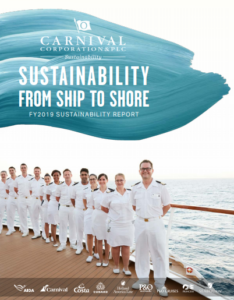In 2019, Carnival Corporation made further progress on its 2020 carbon reduction goal and committed to a new goal of 40% reduction in the intensity of CO2 emissions by 2030, in line with IMO requirements and the Paris Agreement, the company said in its newly launched sustainability report.
Carnival first shared its 2020 sustainability goals in 2015, identifying 10 key objectives, including reducing its carbon footprint, reducing waste generation, and others.
The company’s latest sustainability report details progress made in 2019 to achieve and surpass those goals, while defining an initial set of sustainability commitments beyond 2020.
In terms of carbon footprint, the progress includes achievement of 29.1% reduction in CO2e intensity relative to 2005 baseline, which is additional progress on top of reaching the original goal of 25% reduction in carbon intensity in 2017. Despite these, Carnival has sometimes been at the center of concerns by environmental groups for its emissions.
Additionally, the company committed to a new goal of 40% reduction in its rate of carbon emissions by 2030 relative to 2008 baseline.
Other highlights include:
- Advanced Air Quality Systems: As of the end of 2019, 77% of the fleet was equipped with Advanced Air Quality Systems, capable of removing nearly all sulfur from exhaust, enabling cleaner air emissions at port and at sea with no negative impact to the marine environment.
- Cold Ironing: At the end of 2019, 47 of the company’s ships featured the ability to use shoreside electric power while docked, with the ships able to connect at 12 global cruise ports equipped with the technology, further reducing air emissions in ports where this option is available.
- Advanced Waste Water Treatment Systems: Reached initial goal by achieving a 10.3 percentage points increase in coverage of fleetwide capacity relative to 2014 baseline.
- Waste Reduction: Reached initial goal by achieving a 5.6% reduction in waste rate relative to 2016 baseline and committed to a new food waste reduction goal of 10% across the fleet by the end of 2021. The company also committed to a new goal to reduce all non-essential single-use items and plastics on board by 50% by the end of 2021.
- Water Efficiency: Surpassed goal by achieving an 8.7% reduction relative to 2010 baseline and further improved water efficiency by supplying 82% of water needs from the ocean, purchasing only 18% of the water needed onboard ships at designated ports.
Meanwhile, Carnival continued the use of LNG in the cruise industry by introducing the second LNG-powered ship for its global fleet, Costa Smeralda, which joined AIDAnova as the first cruise vessels in the world to be powered by LNG.
It also became the first cruise company to join The Getting to Zero Coalition for decarbonization.
Explore more herebelow:































































